#black history month 2022
Photo
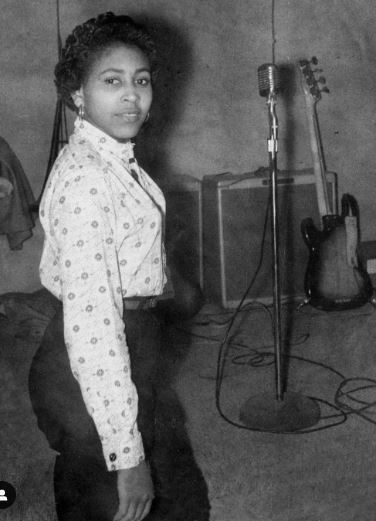
In honour of Black History Month (1 October 2022 to 31 October 2022): recognize this sweet-faced teenager? It’s 19-year-old single mother and aspiring singer Anna Mae Bullock – who grew up to be fierce rhythm and blues sex tigress Tina Turner! This caption from the essential ikeandtinaturner page on Instagram fills in the details: “Tina photographed in 1958. She graduated from Sumner High School in St. Louis this year and she worked as a nurse's aide at Barnes-Jewish Hospital to provide for her son Craig who was born in August 1958. She also sang with Ike's Kings of Rhythm on a part-time basis. In August 1958, she appeared on her first recording, "Boxtop," credited as Little Ann alongside Ike and fellow Kings of Rhythm singer Carlson Oliver.” (If you’ve never heard the song “Boxtop”, Google it – Tina’s wailing voice is already instantly identifiable).
#anna mae bullock#tina turner#ike and tina turner#black history month#black history month 2022#rhythm and blues#bold soul sister#soul diva#lobotomy room#african-american#kween#fierce#young tina turner#rock'n'roll#diva
60 notes
·
View notes
Photo


JACOB ANDERSON • Anne Rice's Interview with the Vampire
2022 • Horror • S01.E01 • dir. Alan Taylor
#celebrating black history month#jacob anderson#gorgeous#beautiful#interview with the vampire#iwtv#iwtv 2022#horroredit#louis de pointe du lac#perioddramaedit#iwtvedit#iwtv amc#loustat#the vampire chronicles#anne rice#horror#tvedit#tvgifs#male beauty#beautiful men
814 notes
·
View notes
Text









Day 1: Louis De Pointe Du Lac (IWTV AMC)
Do not repost.
#pictures of me#my photos#my photography#my cosplay#black cosplay#black photographer#louis de pointe du lac#iwtv amc#iwtv louis#iwtv cosplay#28 days of black cosplay 2023#28 days of black cosplay#day 1#black history month#black cosplayer#i had to cosplay louis#for the first day#because we need more black vampires in media#interview with the vampire 2022
307 notes
·
View notes
Text

happy bhm
#black history month#black history 2022#blm movement#black lives are human lives#black lives matter!#lgbtqiia+#dx#soulles dx#dumb memes#tumblr chaos#pls reblog this#i beg
336 notes
·
View notes
Text
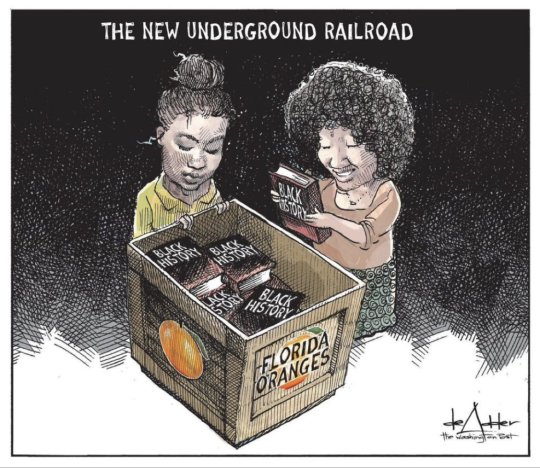
#BlackHistoryMonth ✊🏿✊🏽✊🏿#Black history#us history#black history month#civil rights#civil rights movement#black history 365#black history continued 2021#black history matters#black lives matter#black history 2022#Black history month#black lives fucking matter#black lives movement#ron deathsantis#gov. ron desantis#ron desatanist#ron desanctimonious#ron desantis#florida governor ron desantis
368 notes
·
View notes
Text



Nope (2022) dir; Jordan Peele
#nope#nope 2022#jordan peele#nope movie#keke palmer#brandon perea#daniel kaluuya#heyward#bhm#blm#black history month#horses#nope gifs#nope gif#gif#gifs
37 notes
·
View notes
Text
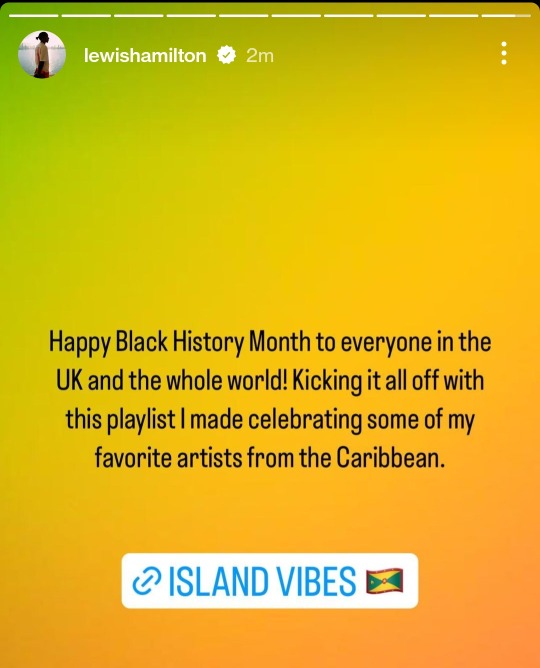
27 notes
·
View notes
Photo
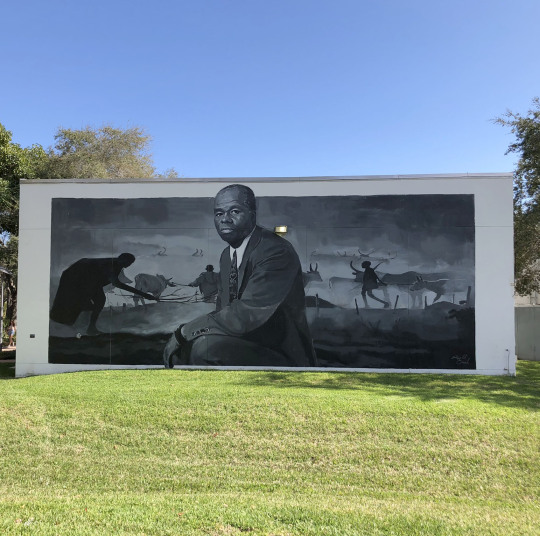
“History is not everything, but it is a starting point. History is a clock that people use to tell their political and cultural time of day. It is a compass they use to find themselves on the map of human geography. It tells them where they are but, more importantly, what they must be.”- Dr. John Henrik Clarke
Dr. John Henrik Clarke was an American writer, historian, professor, and pioneer in the creation of Pan-African and Africana studies. He taught at both Hunter College in NYC, where he established the Department of Black and Puerto Rican studies, and Cornell University where he was the Carter G. Woodson Distinguished Visiting Professor of African History at Cornell University’s Africana Studies and Research Center.
The mural pictured above, Dr. John Henrik Clarke and the Mundari Tribe by Reginald O’Neal, was created for the 2022 edition of SHINE Mural Festival in St. Petersburg, Florida.
#reginald o'neal#dr. john henrik clarke#black history month#st. pete murals#shine mural festival#africana studies#history#quotes#florida artist#painting#art#shine mural festival 2022
9 notes
·
View notes
Text
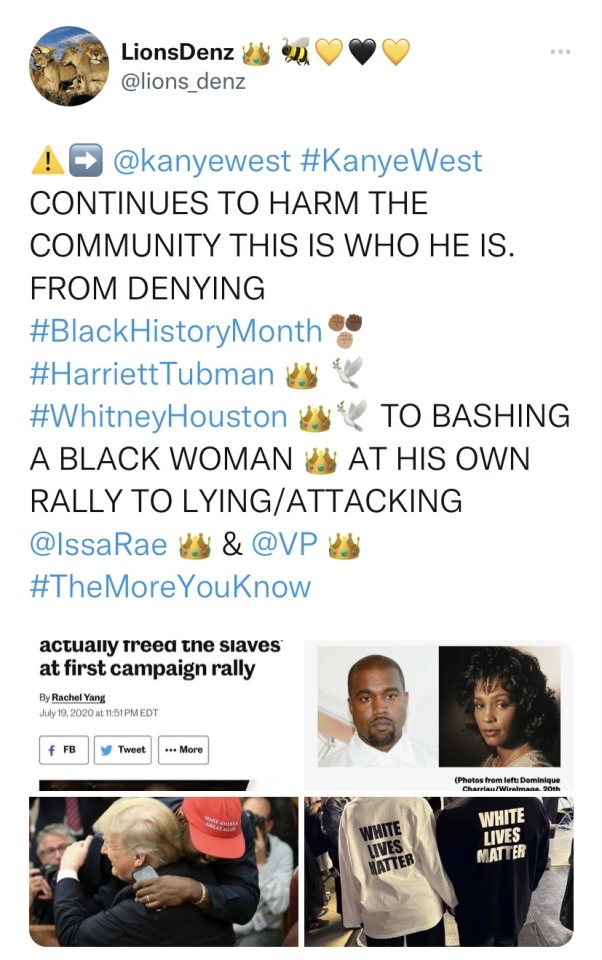

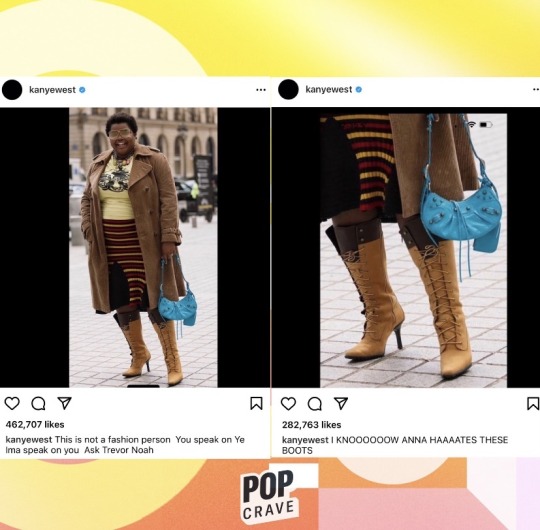
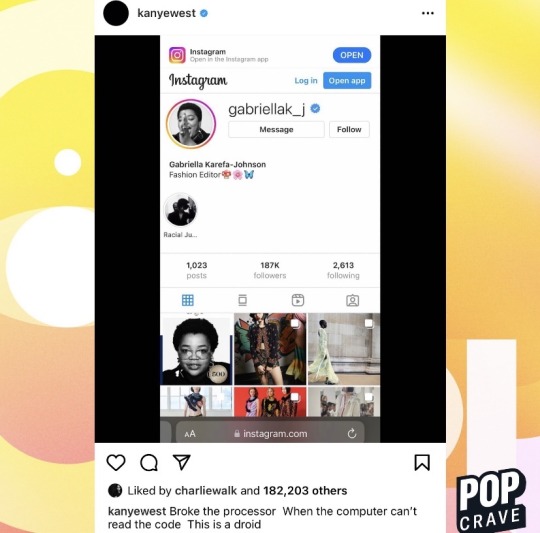
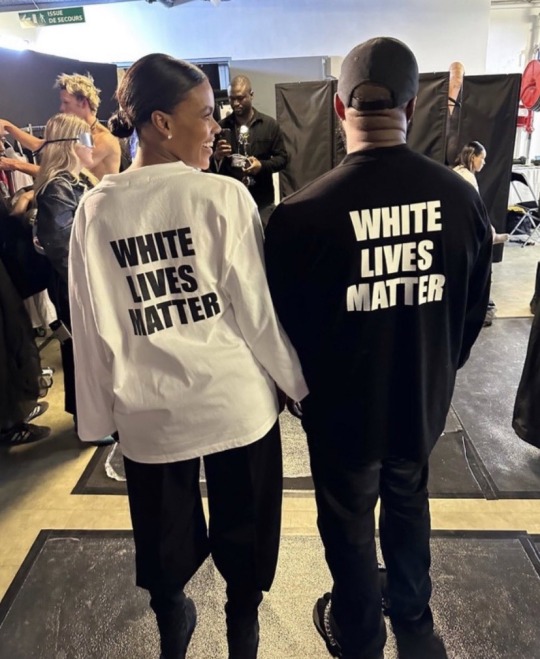
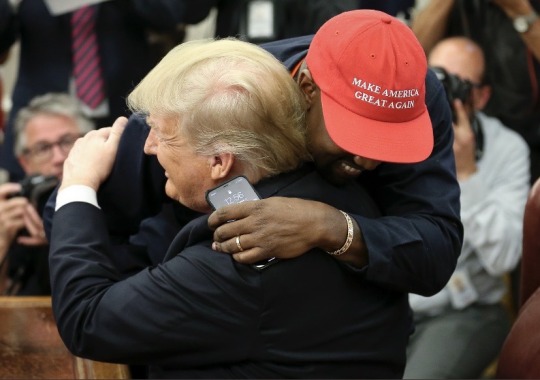

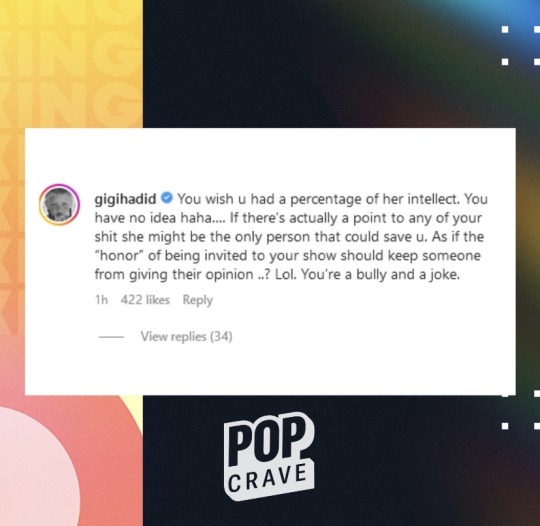


#kanye west#words matter#chaos agent#trump#elections 2020#Kanye west slavery was a choice#Kanye west white lives matter#protect black women#protect black people#elelctionsmatter#elections 2022#black history month#democracyontheballot#the more you know
12 notes
·
View notes
Text
Quote:
How come they gave us the shortest month?
This question often comes from the Black side of the spectrum. Not stupid, just perhaps under-informed. The good news is, a little Black History is all one needs to understand the answer to that question:
National African-American History Month had its origins in 1915 when historian and author Dr. Carter G. Woodson founded the Association for the Study of Negro Life and History. This organization is now known as the Association for the Study of African American Life and History (“ASALH”). Through this organization Dr. Woodson initiated the first Negro History Week in February 1926. Dr. Woodson selected the week in February that included the birthdays of Abraham Lincoln and Frederick Douglass, two key figures in the history of African-Americans.
In 1975, President Ford issued a Message on the Observance of Black History Week urging all Americans to “recognize the important contribution made to our nation’s life and culture by black citizens.” In 1976 this commemoration of Black History in the United States was officially expanded by ASALH to Black History Month, also known as African American History Month, and President Ford issued the first Message on the Observance of Black History Month.- Library of Congress
See? No one “gave us” the shortest month. Black people did it. Black people took agency and created a time to celebrate Black History. Nobody handed it to us. No one made it up for us. Pro-tip: you see something celebrating Blackness, guarantee somebody black was probably behind it. The world ain’t been handing out free “Celebrate Your Blackness” points in a minute.
So to recap: A BLACK PERSON CHOSE FEBRUARY FOR BLACK HISTORY MONTH. And he had serious BLACK REASONS for doing so. If you disagree with Woodson’s reasons, that’s fine. We can certainly discuss. But now you have a Black History answer to your question about Black History Month. Go run tell, tweet and preach that. And read more books. Books are cool.
i highly recommend the entire article and this year's too i'm sure
#i did not know so i am sharing#u.s. history#P. Djèlí Clark#p. djeli clark#black history month#carter g. woodson#2022 edition#but i'm sure he's got one for 2023 now#phenderson djeli clark
2 notes
·
View notes
Text
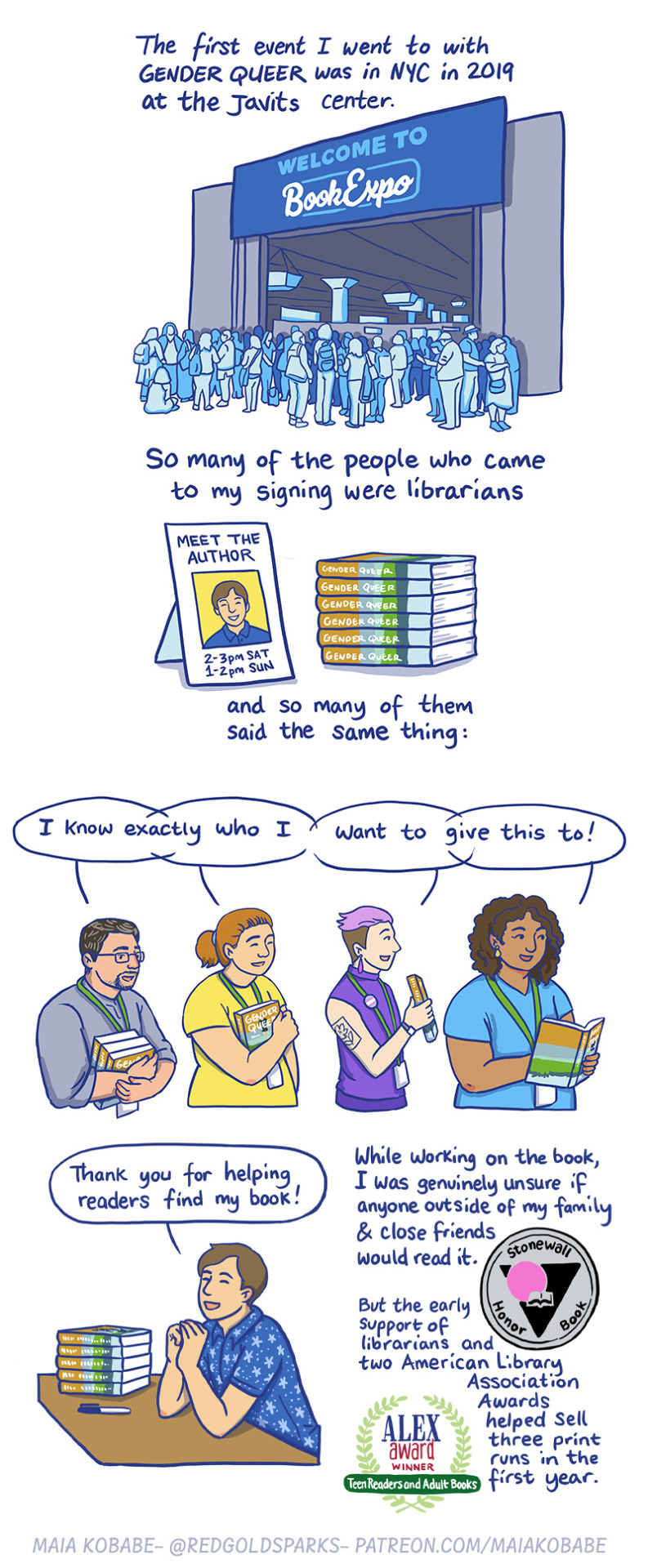
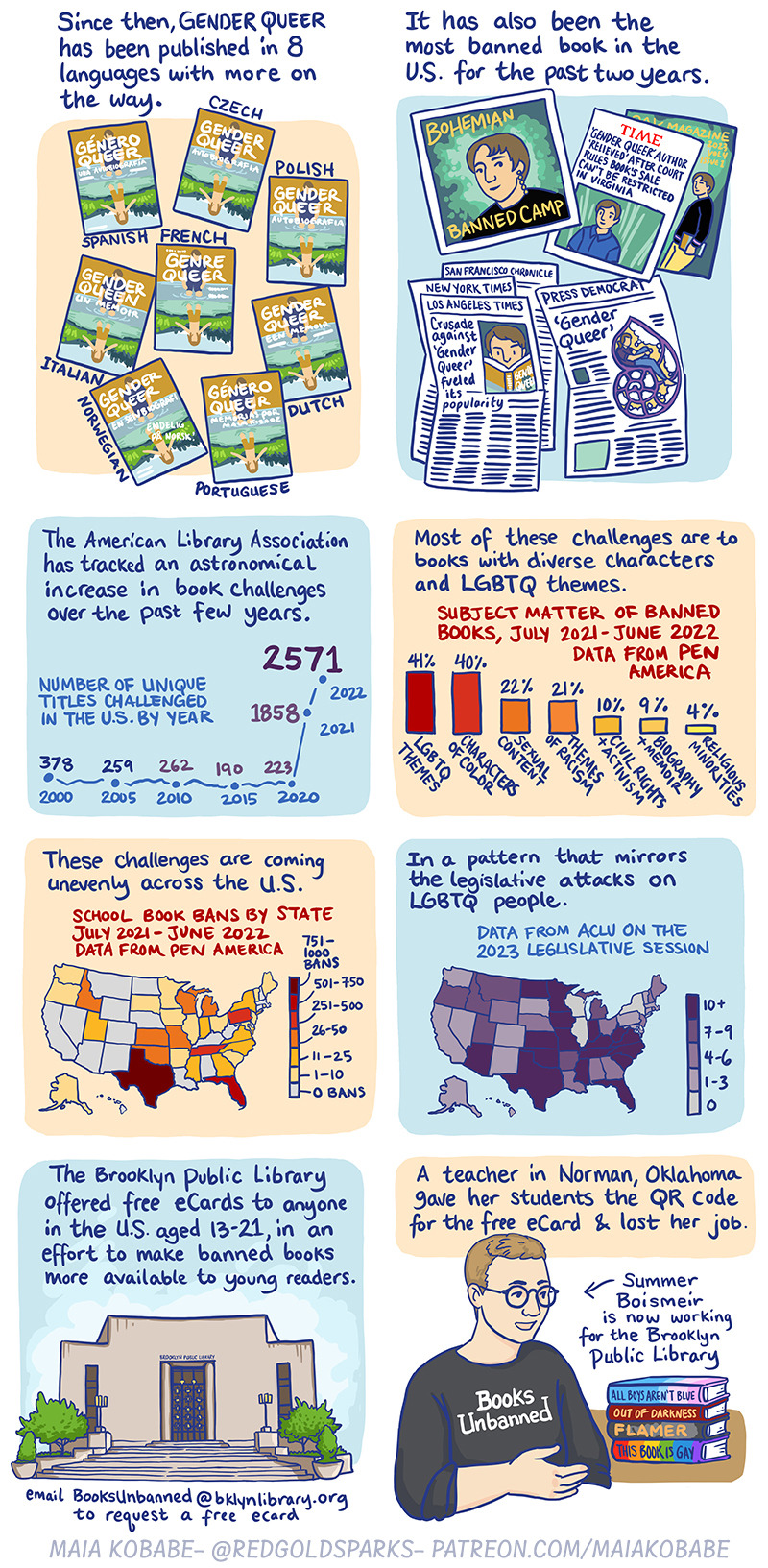
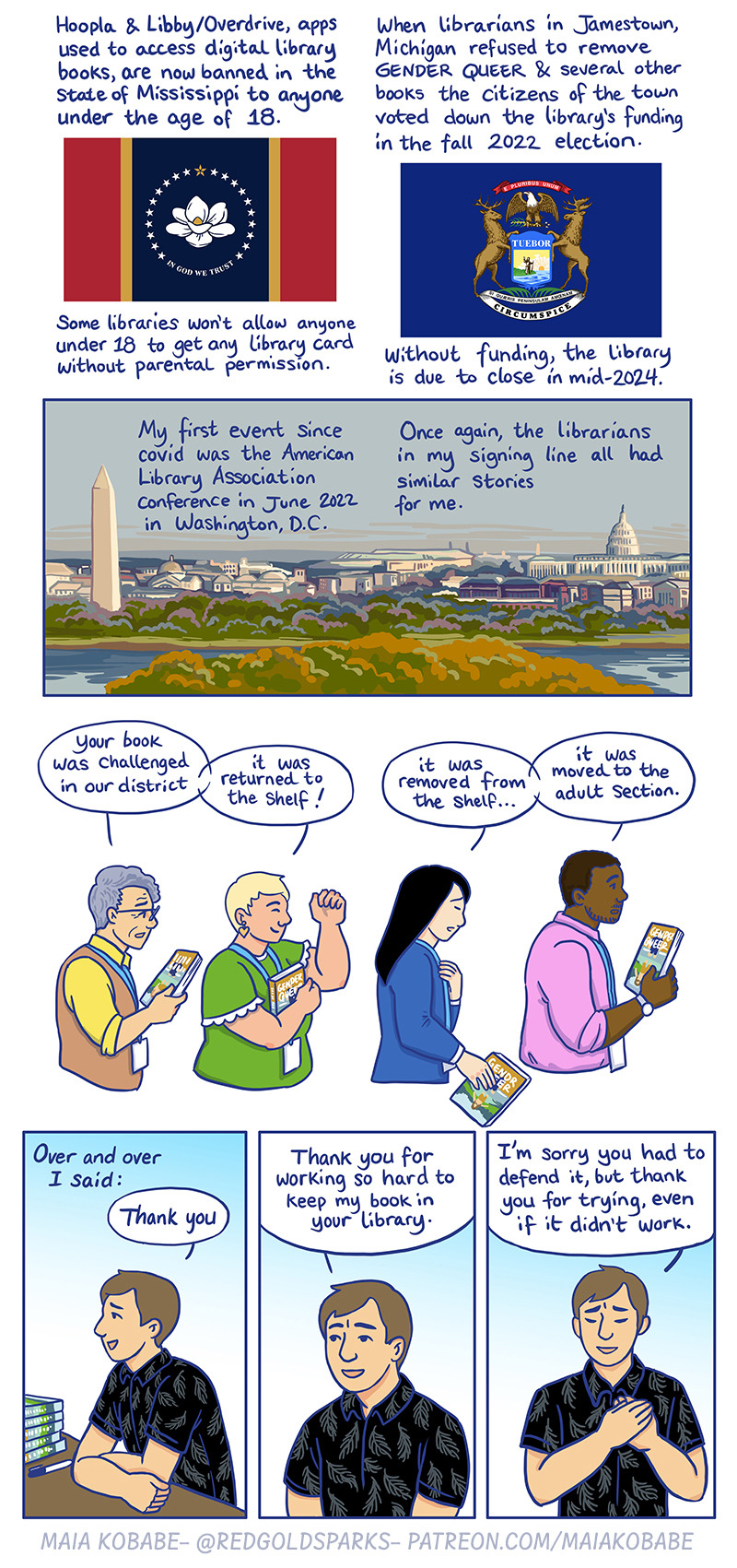
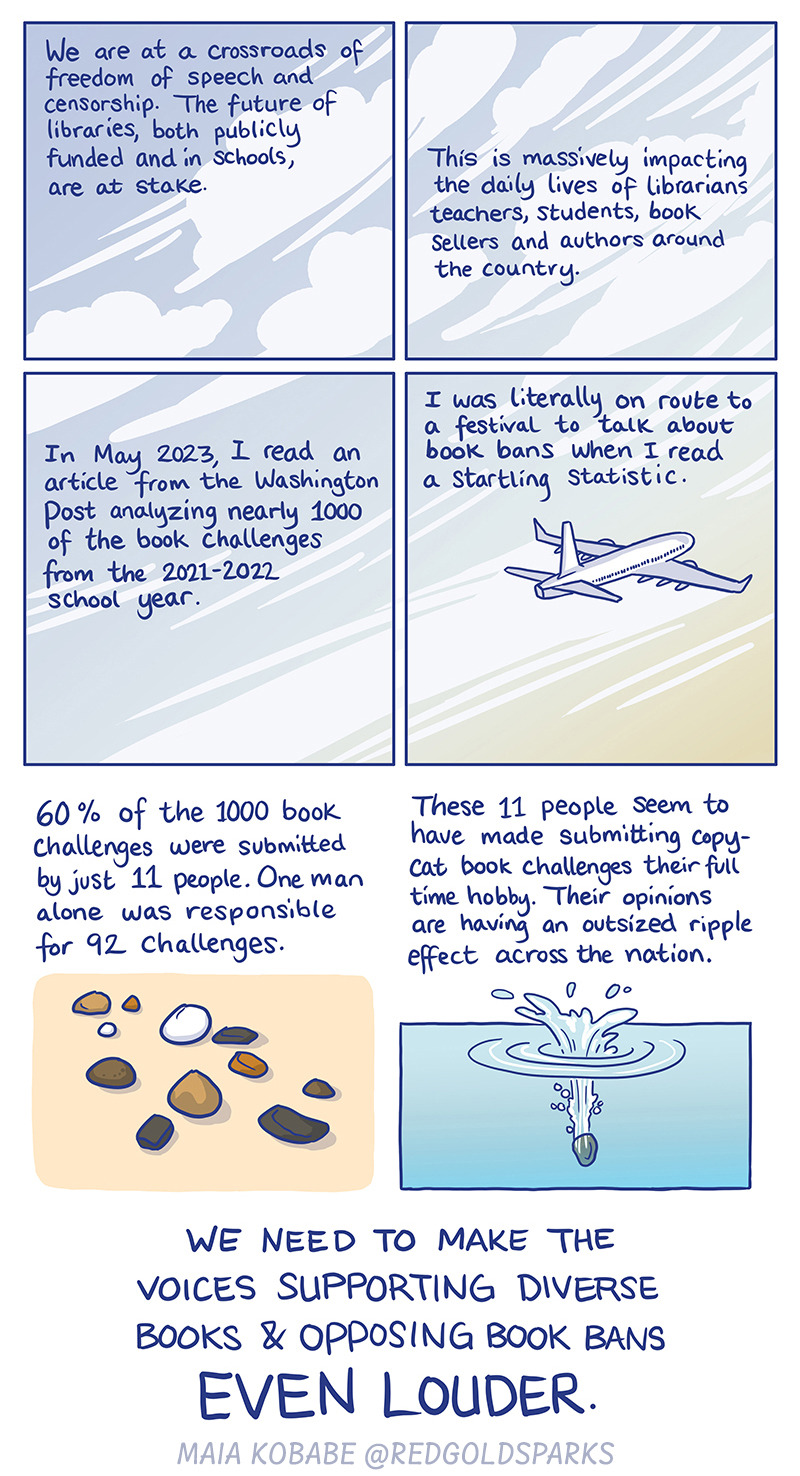
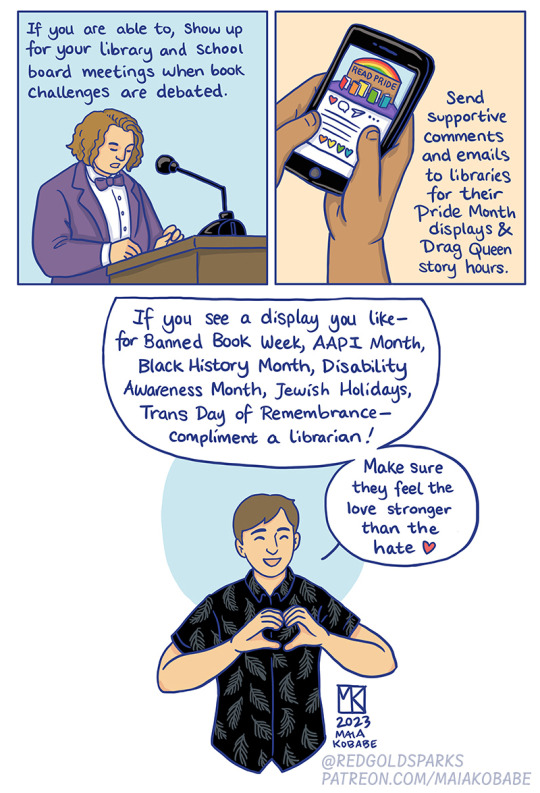
My very last comic for The Nib! End of an era! Transcription below the cut. instagram / patreon / portfolio / etsy / my book / redbubble
The first event I went to with GENDER QUEER was in NYC in 2019 at the Javits Center.
So many of the people who came to my signing were librarians, and so many of them said the same thing: "I know exactly who I want to give this to!"
Maia: "Thank you for helping readers find my book!"
While working on the book, I was genuinely unsure if anyone outside of my family and close friends would read it. But the early support of librarians and two American Library Association awards helped sell two print runs in first year.
Since then, GENDER QUEER been published in 8 languages, with more on the way: Spanish, Czech, Polish, French, Italian, Norwegian, Portugese and Dutch.
It has also been the most banned book in the United States for the past two years.
The American Library Association has tracked an astronomical increase in book challenges over the past few years. Most of these challenges are to books with diverse characters and LGBTQ themes. These challenges are coming unevenly across the US, in a pattern that mirrors the legislative attacks on LGBTQ people.
The Brooklyn Public Library offered free eCards to anyone in the US aged 13-21, in an effort to make banned books more available to young readers. A teacher in Norman, Oklahoma gave her students the QR code for the free eCard and lost her job. Summer Boismeir is now working for the Brooklyn Public Library.
Hoopla and Libby/Overdrive, apps used to access digital library books, are now banned in Mississippi to anyone under 18. Some libraries won’t allow anyone under 18 to get any kind of library card without parental permission.
When librarians in Jamestown, Michigan refused to remove GENDER QUEER and several other books, the citizens of the town voted down the library’s funding in the fall 2022 election. Without funding, the library is due to close in mid-2024.
My first event since covid hit was the American Library Association conference in June 2022 in Washington, DC. Once again, the librarians in my signing line all had similar stories for me: “Your book was challenged in our district"
"It was returned to the shelf!"
"It was removed from the shelf..."
"It was moved to the adult section."
Over and over I said: "Thank you. Thank you for working so hard to keep my book in your library. I’m sorry you had to defend it, but thank you for trying, even if it didn't work."
We are at a crossroads of freedom of speech and censorship. The future of libraries, both publicly funded and in schools, are at stake. This is massively impacting the daily lives of librarians, teachers, students, booksellers, and authors around the country. In May 2023, I read an article from the Washington Post analyzing nearly 1000 of the book challenges from the 2021-2022 school year. I was literally on route to a festival to talk about book bans when I read a startling statistic.
60% of the 1000 book challenges were submitted by just 11 people. One man alone was responsible for 92 challenges. These 11 people seem to have made submitting copy-cat book challenges their full-time hobby and their opinions are having an outsized ripple effect across the nation.
WE NEED TO MAKE THE VOICES SUPPORTING DIVERSE BOOKS AND OPPOSING BOOK BANS EVEN LOUDER.
If you are able too, show up for your library and school board meetings when book challenges are debated. Send supportive comments and emails about the Pride book display and Drag Queen story hours. If you see a display you like– for Banned Book Week, AAPI Month, Black History Month, Disability Awareness Month, Jewish holidays, Trans Day of Remembrance– compliment a librarian! Make sure they feel the love stronger than the hate <3
Maia Kobabe, 2023
The Nib
19K notes
·
View notes
Text







Black History Month 2022
0 notes
Text




@creatorsofcolornet event 19: Black history month
nope (2022)
#ccnet#nope#nope 2022#nopeedit#scifiedit#filmedit#horroredit#userfilm#cinematv#dailyflicks#filmgifs#tvandfilm#sandushengshou#tusermona#tuserskc#my stuff#mymiscedit#myccnetedit#not as fancy as i would've liked but i have no time rip
1K notes
·
View notes
Text
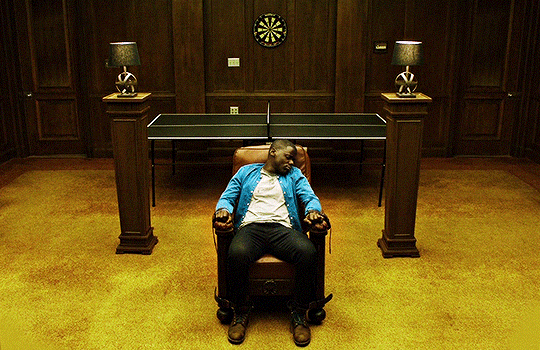





Get Out (2017) | Us (2019) | Nope (2022)
Filmography: Jordan Peele
↳ @creatorsofcolornet event 19: Black history month
#dailyflicks#horroredit#horrorfilmgifs#useralien#userhann#userraffa#usertj#tuserjen#filmgifs#userdanahscott#userbuckleys#userriel#underbetelgeuse#ccnet#gifs#filmography#*#*event#getoutedit#usedit#nopeedit#get out#nope#us#jordan peele
933 notes
·
View notes
Text
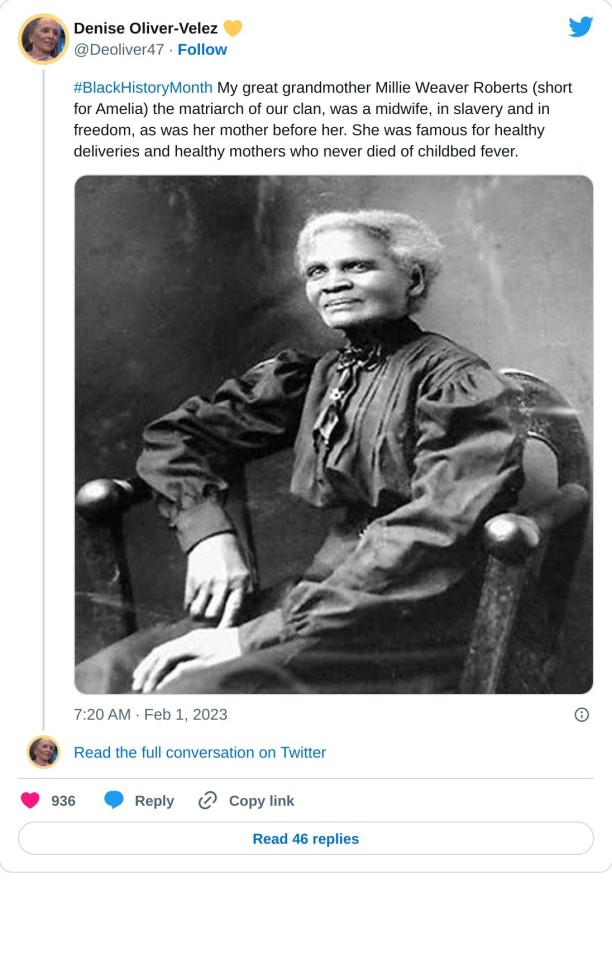
#black lives movement#black lives matter#blm#black lives fucking matter#Black history#us history#black history month#civil rights#civil rights movement#black history 365#black history continued 2021#black history matters#black history 2022
337 notes
·
View notes
Text
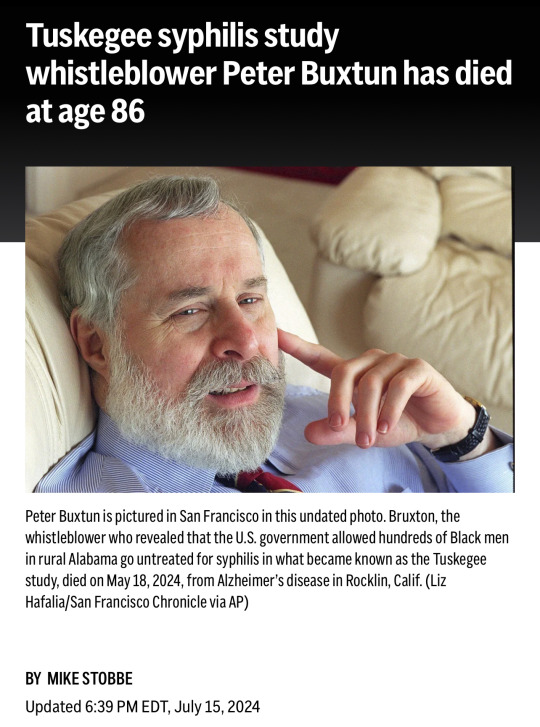
NEW YORK (AP) — Peter Buxtun, the whistleblower who revealed that the U.S. government allowed hundreds of Black men in rural Alabama to go untreated for syphilis in what became known as the Tuskegee study, has died. He was 86.
Buxtun died May 18 of Alzheimer’s disease in Rocklin, California, according to his attorney, Minna Fernan.
Buxtun is revered as a hero to public health scholars and ethicists for his role in bringing to light the most notorious medical research scandal in U.S. history. Documents that Buxtun provided to The Associated Press, and its subsequent investigation and reporting, led to a public outcry that ended the study in 1972.
Forty years earlier, in 1932, federal scientists began studying 400 Black men in Tuskegee, Alabama, who were infected with syphilis. When antibiotics became available in the 1940s that could treat the disease, federal health officials ordered that the drugs be withheld. The study became an observation of how the disease ravaged the body over time.
In the mid-1960s, Buxtun was a federal public health employee working in San Francisco when he overheard a co-worker talking about the study. The research wasn’t exactly a secret — about a dozen medical journal articles about it had been published in the previous 20 years. But hardly anyone had raised any concerns about how the experiment was being conducted.
“This study was completely accepted by the American medical community,” said Ted Pestorius of the U.S. Centers for Disease Control and Prevention, speaking at a 2022 program marking the 50th anniversary of the end of the study.
Buxtun had a different reaction. After learning more about the study, he raised ethical concerns in a 1966 letter to officials at the CDC. In 1967, he was summoned to a meeting in Atlanta, where he was chewed out by agency officials for what they deemed to be impertinence. Repeatedly, agency leaders rejected his complaints and his call for the men in Tuskegee to be treated.
He left the U.S. Public Health Service and attended law school, but the study ate at him. In 1972, he provided documents about the research to Edith Lederer, an AP reporter he had met in San Francisco. Lederer passed the documents to AP investigative reporter Jean Heller, telling her colleague, “I think there might be something here.”
Heller’s story was published on July 25, 1972, leading to Congressional hearings, a class-action lawsuit that resulted in a $10 million settlement and the study’s termination about four months later. In 1997, President Bill Clinton formally apologized for the study, calling it “shameful.”
The leader of a group dedicated to the memory of the study participants said Monday they are grateful to Buxtun for exposing the experiment.
“We are thankful for his honesty and his courage,” said Lille Tyson Head, whose father was in the study.
(continue reading)
#politics#peter buxtun#whistleblowers#tuskegee experiments#black history#medical racism#rip hero 🫡#rest in peace
348 notes
·
View notes